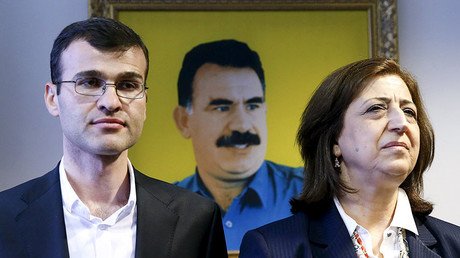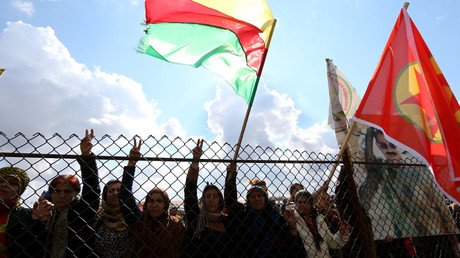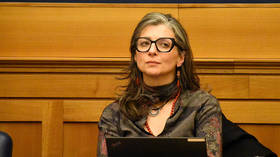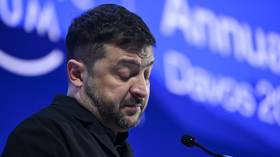Kurds want lands they control in Syria to become federation under Damascus
Kurdish-controlled autonomous areas in northern Syria are expected to declare a federal system, local media and RT's sources on the ground have said. The conference to declare the federation of three Western Kurdistan enclaves will be in Rmelan.
Barzan Iso, a Kurdish journalist, has confirmed the news to RT. "Now the conference has just started in Rmelan, about 200 representatives of Rojava have joined [the event]. They represent different ethnicities and nationalities. There are Kurds, Arabs, Assyrians, Syriacs, Turkomans, Armenians, Circassians and Chechens," he told RT on Wednesday. "Also we have representatives from the Syrian democratic forces, YPG, women defense units."
"This conference is supposed to announce a federation as a political project for Rojava region in northern Syria," Iso added.
A newly established system would see the autonomous cantons in Syria Kurdistan (Rojava) replaced.
Syrian Kurds effectively control a stretch of 400 kilometers (250 miles) along the Syria-Turkey border, from the frontier with Iraq to the Euphrates River. They also control a section of the northwestern border in the Afrin area.
The Kurdish-controlled areas will reportedly be named the Federation of Northern Syria and represent all ethnic groups living there, said Idris Nassan, an official in the foreign affairs directorate of Kobani – one of three autonomous areas set up by Kurdish groups two years ago.
Nassan told RT Arabic that the Kurdish proposal for the “federalization” of Syria existed since the very start of the conflict five years ago.
“Syria's Kurds have a long history of opposition and a long history of struggle for the legitimate rights of their people in this country,” Nassan said, explaining that over time this nationalist struggle transformed into a more “developed” form of fighting for equal rights in general.
For Kurds, federalization looks like the best way out of the 5-year crisis and suffering, said Nassan, though adding that it does not mean Kurdish people would go down the “path of separatism.”
“Therefore, I believe that the international players, primarily Russia and the United States will support this approach and advocate for its implementation,” Nassan added in an interview with RT Arabic.
The federal system would mean “widening the framework of self-administration which the Kurds and others have formed," Nassan told Reuters.
Kurdistan would, however, still remain within Syria as an autonomous region, a Kurdish representative told RIA Novosti.
"Within days, probably today, self-governing [bodies] of three Kurdish cantons in Syria's north will declare a federation," Abd Salam Ali, representative of the PYD party in Moscow, told RIA Novosti on Wednesday. "Separation of Rojava [Western Kurdistan] from Syria is not an option. We remain [a part of Syria], but declare a federation," he said.
Syrian Kurds expect their experience to be applicable to other ethnicities and religious communities in Syria, according to Ali. "Our experience would be useful for Alawites and Sunnis. Perhaps, this is the key to [bringing] peace in our country."
"We have the so-called Project of Democratic Syria. We also had this project before. We also have the Commission preparing everything for this project.” Senam Mohamed, the European representative of the Rojava administration, told Sputnik on Wednesday.
In the meantime, Turkey said that any unilateral move aimed at declaring a federation cannot be valid adding that it supports Syria’s national unity and territorial integrity. The administrative structure of Syria will be decided by all Syrians through the adopting of a new constitution, a source in the Turkish foreign ministry told Reuters.
READ MORE: Syrian Kurds declare autonomy on eve of Geneva 2
Damascus has also rejected the federation project citing the necessity to preserve Syria's territorial integrity and independence. "Here we speak of how to preserve the unity of Syria and its independence and territorial integrity," Bashar January, head of the Syrian delegation at the Geneva talks, was quoted as saying by Interfax. "Drawing any lines between Syrians would be a great mistake,"he added, stressing that the Syrian Kurds were an important part of the Syrian people.
Kurds are a major component of Syrian society and they should participate in the Geneva talks and have a say in deciding the country’s future as a united and sovereign state, Syria’s former ambassador to Turkey Nidal Kabalan told RT.
“I believe that the move by some Kurdish factions in northeastern Syria to bring some areas that they have controlled into a sort of federalism is something that is mainly rejected by the Syrian government, before we talk about the Turkish reaction, for a very simple reason: Kurds have always been a genuine component of Syrian society. They should have a say in the future of the country within the framework of territorial integrity, which has been guaranteed by international law and a UN resolution, and which is the main basis of the ongoing Geneva talks,” Kabalan told RT.
But if every minority rushed for independence this will undermine the Syrian state itself, and will be widely rejected not only by the government but the entire society as well, Kabalan emphasized.
Washington, which supported Rojava in its battle against Islamic State, also said that it would not recognize the new federation.
Rojava, or Western Kurdistan, has been a de-facto Kurdish-administered autonomous region of Syria since 2012, after government’s forces abandoned the area. Most of the two million plus Syrian Kurds live in Rojava, making up the majority of the region, followed by Syrian Arabs and smaller communities of Assyrians and Turkomans. In January 2014, the Democratic Union Party (PYD) declared all three Rojavan cantons - Afrin, Kobane and Jazira – autonomous.
Rojava’s interim constitution, officially known as the Charter of the Social Contract, came shortly after the declaration of autonomy. It calls for the peaceful coexistence of all ethnic and religious communities enjoying pluralism and democracy, but nonetheless stresses that the region shall remain an integral part of Syria.
Exclusion from Syria peace talks
The move comes in the wake of the Syrian Kurdish PYD party being left out of peace talks in Geneva aimed at ending the Syrian civil war.
The Syrian Kurdish YPG militia has proved to be an effective participant in the military campaign against Islamic State (IS, formerly ISIS/ISIL) in northwestern Syria.
The exclusion is in line with the wishes of Turkey, which sees the party as an offshoot of the militant Kurdistan Workers' Party (PKK), which Ankara is currently battling in southeastern Turkey, northern Syria, and Iraq. If the Federal System of Northern Syria goes ahead, it is likely to set off alarm bells in Ankara.
However, Moscow has strongly insisted that the Kurds be invited to upcoming peace talks, suggesting that leaving them out could endanger Syria's territorial integrity. Staffan de Mistura, the UN envoy to Syria, has also said the Syrian Kurds deserve a spot at the negotiating table in Geneva.
"The second round of inter-Syrian talks is underway in Geneva, but Syrian Kurds were not invited. It means that the future of Syria and its society is decided without Kurds. In fact, we are pushed back into a conservative, old-fashioned system which does not fit well with us," Rodi Osman, the head of Syrian Kurdistan's office in Moscow, told RIA Novosti. "In light of this, we see only one solution which is to declare the creation of [Kurdish] federation. It will serve the interests of the Kurds, but also those of Arabs, Turks, Assyrians, Chechens and Turkomans - all parts of Syria's multinational society.
"Given the complicated situation in Syria, we would become an example of a system that may resolve the Syrian crisis," Osman added.
In turn, Syria's UN representative Bashar Jaafari said that talks were hampered by the "absence of half or two-thirds of all the opposition," with the lack of representation rendering the format of the talks "very weak."














